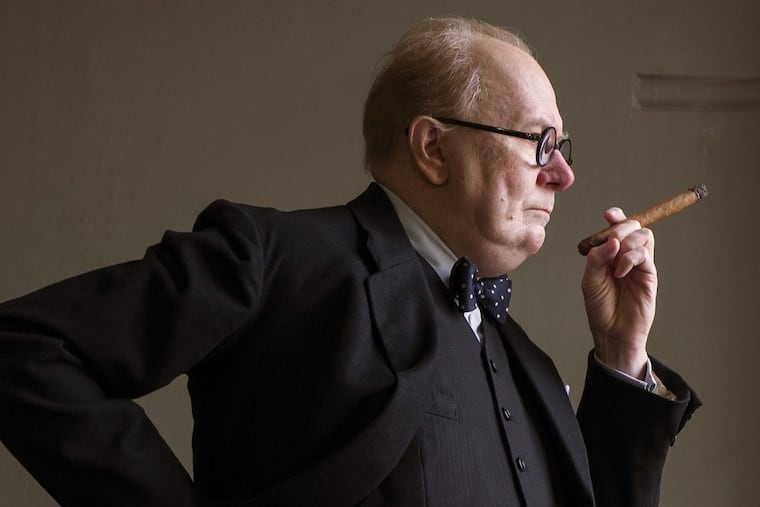Why Gary Oldman never wanted to play Winston Churchill, and how 'Darkest Hour' changed his mind
Gary Oldman is a shoo-in for an Oscar nomination for his work in "Darkest Hour" as Winston Churchill, Britain's colorful wartime prime minister.

You could teach a pretty good course on modern British history using the movies of Gary Oldman.
The syllabus would include a section on anarchy in the U.K and Thatcher's England, featuring Sid and Nancy. Tinker Tailor Soldier Spy (for which Oldman was nominated for an Oscar) could illustrate Britain's changing role on the postwar stage.
As for the war itself, now we have Oldman playing Winston Churchill in Darkest Hour.
It's a testament to the actor's virtuosity that the first two films show Oldman playing quintessential Englishmen — Sid Vicious and George Smiley — who exist on completely different ends of the behavioral spectrum. Darkest Hour finds Oldman pulling from both ends to play Britain's wartime prime minister, who could be bombastic one minute — usually for effect — and the picture of English understatement and reserve the next.
Oldman's a shoo-in for an Oscar nomination as Churchill, a role that Oldman was desperate not to play — too many great British actors had already been there (most famously Albert Finney in The Gathering Storm and most recently Brian Cox in Churchill). Also, Oldman loves to do thorough research, and in this case there was simply too much — Churchill authored 50 books, not to mention the copious biographies.
Once he took on the assignment and started doing the work, he was awed by the man's genius, which often expressed itself in pithy quotes. Oldman and I had a brief back-and-forth simply quoting Churchill's putdowns of his successor, Clement Attlee.
"An empty cab arrived at 10 Downing Street, and when the door opened, Attlee emerged."
"A modest man who has much to be modest about."
"Churchill was funny as hell," said Oldman, who read as much as he could and also watched archival footage of the man in action.
"What I discovered was that he had this great energy. He was leaping around at 65 like he was 20. And he had this cherubic grin on his face, and very often a twinkle in his eye, which you could see even in the old black and white," said Oldman, who plays Churchill in that live-wire manner.
"Occasionally, he's been played as a man in a bad mood. Curmudgeonly, grumpy, drinking whiskey, and chomping on a cigar and moping around with a black dog. I saw someone who was energized and full of vigor and life. There were times when [director Joe Wright] said to me, 'You know, he was really like a naughty schoolboy.' There was a real sparkle to him."
Of course, at the outset of war, Churchill was also animated by what he viewed as the great cause of his life — rallying Britain and the world to contend with Adolf Hitler, whom Churchill recognized as a historical world menace long before his political colleagues did.
Churchill had traveled widely in Germany during the 1920s and '30s, Oldman said, and had made a study of that country's volatile cultural and political upheaval.
"He happened to be there in '32 and saw the uprising of the Hitler youth, the brown shirts. He saw what Hitler was up to. He got an idea of what was happening to the Jews, and when he came back [to Parliament] as a backbencher, he said, 'We need to rearm. They've got fire in their eyes, and they're looking for war.' "
Many Europeans, still bearing the horrific scars of the WWI, didn't want to hear it.
"It made him very unpopular," Oldman said. "He was like a dog with a bone with 'Hitler this, Hitler that.' But he knew what was coming. It's hard to believe now, because we look at history in hindsight and think it was a no-brainer, but Churchill was ahead of his time in that regard."
Churchill's battle with establishment politicians and peace advocates is a lively feature of Darkest Hour, which had Churchill forming an uneasy alliance with King George VI (Ben Mendelsohn). All of this occurs in a tight time frame, against the backdrop of the Dunkirk evacuation.
"I call him the indispensable man. You can't see history unfolding in the same way without him. He believed he was destined to be there at that moment in time, and I believe that, too," Oldman said. "He survived four wars, and survived a stray bullet that would have killed him had it been an inch in another direction. History conspired to give him a unique perspective on events unfolding in Europe, and a unique position to do something about it. And he did."
He's delighted in retrospect that he reversed his initial refusal to play the role — a refusal based in part on that fact the he knew he'd need heavy makeup to look the part.
His condition: He'd do the role only if he could have Kazuhiro Tsuji, the much-lauded makeup artist who has worked on such movies as the 2001 Planet of the Apes and The Curious Case of Benjamin Button. Director Wright had to bring Kazuhiro out of retirement, but it worked.
"It was an interesting process. I would get in very early in the mornings and get into the prosthetics and clothes and everything, and by the time Joe and the crew arrived, I was already in character as Winston. Joe didn't really see Gary for three months," he said. "This had its advantages. It changed the way people reacted to you and responded to you. I could be funny and cheeky, but through Winston, and everybody enjoyed it. By the end, they warmed to him. They really loved Winnie as much as I did."